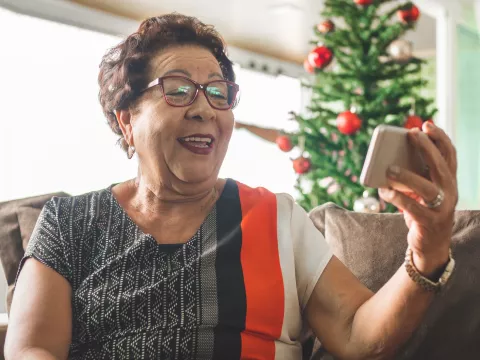- AdventHealth Centra Care

’Tis the season to celebrate with loved ones. It’s the time of year when we gather to appreciate the gifts of friendship, family and connection — to feel thankful for what’s meaningful.
However, if you or your loved ones are at increased risk for complications from COVID-19, spending time together in person may not be possible. The Centers for Disease Control and Prevention (CDC) encourages those at increased risk of severe illness from the coronavirus, including older adults and people with medical conditions, and those who live with them, to consider their risk level before venturing out.
Even if you take every precaution, travel may increase your chances of contracting and spreading the virus to others. Before making holiday travel plans, the CDC recommends checking the number of COVID-19 cases in the last seven days in the states you’ll be traveling to.
If you won’t be visiting relatives this year, these coping strategies can help you find creative ways to celebrate apart — and navigate the difficult emotions that may arise this holiday season.
1. Use technology to manage feelings of loneliness.
If you have to be physically separated from friends and family during the holidays, using technology, such as video chat, phone calls and text messages, can help bring everyone together and ease feelings of isolation.
There are many social media and videoconferencing platforms, such as Zoom, FaceTime, Skype and WhatsApp. Choose the one you like best and select a time during the holidays to connect with everyone for a chat, board game or other festive activity.
With video chats, you can even expand your circle by inviting distant relatives and friends from all over the world into the holiday fold. There’s no limit to whom you can catch up with on your device. Consider reaching out to others who are in a similar situation.
2. Seek company to beat the holiday blues.
Even without a pandemic, the holidays can stir feelings of anxiety or depression. Unrealistic expectations, sentimental memories, loss of a loved one or even less sunlight during this time of year can trigger holiday blues. Try to stay as social as possible by safely spending time with caring, supportive people who live locally.
For all gatherings aside from immediate family members who live with you, be sure to follow social distancing guidelines. To maintain a safe social distance from those who don’t live in your household, the CDC recommends:
- Arranging seating to be at least 6 feet apart
- Encouraging guests to bring their own food and beverages
- Gathering outside, if possible
- Opening windows for increased ventilation if you’ll be meeting indoors
- Wearing masks if you’ll be sitting or standing less than 6 feet apart
Social distancing doesn’t have to cramp your style. Gatherings with safe COVID-19 precautions can still be festive and fun.
3. Consider volunteering.
If you find yourself alone this holiday season, volunteering to help those less fortunate can be a source of comfort and a useful strategy to ease loneliness. Since the holidays are associated with delicious food, why not contact your local food bank to learn how you can help? There may also be volunteer opportunities to shop for presents or collect winter clothing.
4. Exercise to boost your mood.
There’s nothing like exercise to brighten your outlook and help manage holiday stress. The CDC recommends taking care of your body with regular exercise. Life can be busy during the holidays, but even parking a bit farther away from the store entrance to squeeze in a few extra steps may help boost your well-being.
5. Take time out for yourself.
Even if you can’t be with loved ones due to COVID-19 precautions, you may still have more to do than usual — such as shopping, decorating and planning meals. To help manage the stress of a long to-do list, be sure to take time to recharge. Try going for a long walk, reading a book or listening to your favorite music or podcast.
6. Comfort those who may be grieving.
The holiday season can be especially painful for those who have lost a loved one. Maybe you are grieving yourself. If you can’t be with friends and family members to comfort them, be sure to reach out to check in and share warm memories about the person they have lost. If you feel comfortable, the American Psychological Association recommends mentioning the deceased, not avoiding the topic. This gives the grieving person permission to express some of their sad feelings, remember happier times and keep their loved one’s memory alive.
7. Seek help if you need it.
If the holiday blues seem to linger or become more intense, an underlying mental health issue seems to be worsening, or you just don’t feel like yourself, it’s OK to seek help. As with a physical illness, such as diabetes or heart disease, mental health issues deserve treatment, too. We are here to help. At AdventHealth, our experienced behavioral health team offers a variety of services.
You can count on us for support and mental health treatment for depression, bipolar disorder, anxiety, PTSD and more. We provide the whole-person mental health services that can guide you down a path of confidence, hope and renewed strength — especially during the holidays when many of us need some extra support.
More Support Is Available
Consider scheduling a telehealth or in-person office visit with your primary care physician to discuss how you’re feeling. Each of these free mental health resources is also available. These confidential resources are offered in multiple languages and here for everyone:
211 is an essential service available 24/7 that connects people to expert social services support in their local area. Trained specialists are available at any time to assist people with mental health crises, referral services and disaster assistance. You can call or text 211 or visit www.211.org.
Crisis Text Line is here for you if you’re experiencing any kind of emotional or mental crisis. It’s a convenient option if you’d rather not or are unable to talk on the phone, and you can connect with a trained crisis counselor in less than five minutes, in most cases. From your phone, text HOME to 741741, or visit www.CrisisTextLine.org for more information.
The SAMHSA Disaster Distress Helpline is from the Substance Abuse and Mental Health Services Administration, a national organization dedicated to helping people with substance use disorders and mental health conditions. You can reach trained crisis counselors on this line at any time if you’re experiencing emotional distress. Call 800-985-5990 or text 66746 to talk with a counselor. Or visit www.SAMHSA.gov/find-help/disaster-distress-helpline. Help is available 24/7.
The National Alliance on Mental Illness HelpLine is a peer-support service line staffed with trained volunteers who can answer your questions, offer support and provide practical next steps for you — no matter what kind of mental health crisis you’re facing. Call 800-950-NAMI (6264) or visit www.NAMI.org/help. The HelpLine is available Monday through Friday, from 10 am to 6 pm Eastern Standard Time.
The National Suicide Prevention Lifeline offers free, confidential support to anyone in emotional distress, including from suicidal thoughts. They offer both phone calls and online chatting with trained crisis counselors. Contact 800-273-8255 or www.SuicidePreventionLifeline.org. To chat online, visit www.SuicidePreventionLifeline.org/chat. The service is available 24/7.
We’re Here for You This Holiday Season and Beyond
You may feel physically isolated during the pandemic, but remember that you are far from alone. There’s always help available to you, and you can even seek convenient virtual care in the comfort of home. To stay informed on COVID-19 updates, visit our Coronavirus Resource Hub.





